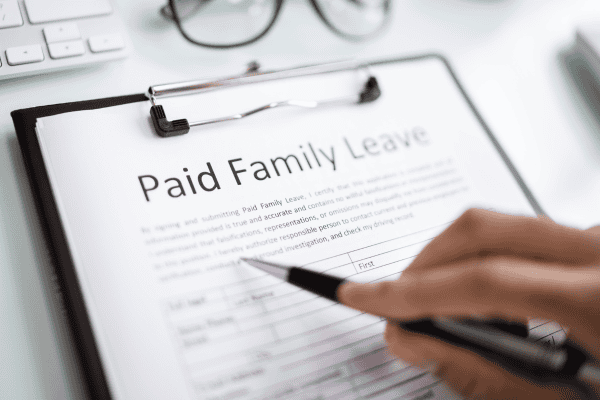We all know who you are…
You’re the one who NEVER calls in. You always show up to work.
Rain, sleet or snow. The world is coming to an end. Doesn’t matter. You will be there.
But like a blue moon, you actually get sick. I mean really sick. And you can’t physically get out of bed let alone go to work.
Or maybe something devastating unexpectedly happens in your life.
So how do you call in sick to work in a professional manner so you can rest easy and your manager doesn’t give you the stink eye when you get back?
In this quick step by step guide, you’ll learn exactly how to inform your employer quickly and professionally, with a few examples you can use that work every time.
Step 1: When to Call in Sick

While you may pride yourself in being a workplace machine, there are times to call in sick when you feel your heath or workplace efficiency is in question. Taking a sick day when you need it prevents spreading illness, underperforming, or burning out.
Physical Health Issues
Common illnesses like the common cold or food poisoning are worthy reasons to stay home. Signs and symptoms to call in sick include:
- Fever
- Vomiting
- Extreme fatigue
- Chills
- Muscle aches
- Diarrhea
- Severe cough
Severe symptoms like these should not only keep you home but may require urgent care:
- Severe and persistent headaches
- Uncontrollable coughing
- Chest pain or difficulty breathing (ie. asthma exacerbation)
- Sharp abdominal pain
Contagious Illnesses
If you’re exhibiting symptoms of a contagious illness like coughing, fever, and sore throat, it’s even more important you stay home. Why?
- You protect your colleagues from getting sick
- Depending on where you work, you want to protect the patients you care for
- The more you work, the less time you rest, increasing the amount of time it takes for you to recover. This hurts your pocketbook, as well as the productivity of your team.
Family and Personal Emergencies
Some things are beyond your control. Any of the following can pop up, making it completely appropriate for you to take a personal day:
- Family emergencies, such as a car accident involving yourself or family member
- Taking time off to care for a sick family members
- Death in a family
- Home emergencies, like a pipe burst
Mental Health Days
Beleive it or not, its ok to call in sick if you just need a day to recharge. Ultimately, its a good thing for you and the customers or patients you serve and colleages you work with.
A mental health day is very acceptable and prioritizes your well-being. If you feel overwhelmed or anxious, a rest day can help you reset and return more focused.
Remote work has also mistakenly made some believe sick days are less necessary. Those who work remote will tell you that it’s still very stressful to work from home and time off is just as important.
Activities during a mental health day can include checking in with a therapist, getting outdoors, or a staycation at home.
Step 2: Notify Your Employer

The quicker you can communicate with your boss your sick call the better, ideally before your work shift starts. This will help your employer find coverage to maintain workflow. Follow up within work hours to confirm your absence.
Some workplaces will require you to find your own coverage as well so be familiar with your companies policies.
If it’s the night before your shift, you can still call in sick. In fact, it’s probably more beneficial to your management than the morning of. This gives your employer some time to find coverage and make adjustments to the workflow.
Calling vs. Texting
Choose a communication method that aligns with your boss’s preferences or company policy. Some employers may prefer a phone call, while others might accept a text message, page, or email.
Writing a Sick Day Email
If email is an option, be sure to keep it brief, direct, and clear. State your name, mention you are unwell, and request a sick day.
Mention the reason for your absence and the expected duration briefly in your email. Include any necessary information to provide details, such as availability for urgent communications during your sick leave.
Step 3: What to Say When Calling in Sick
Here are a few examples you can use to share with your boss when you are calling in sick depending on the nature of your call. Just change up the details and personalize to your situation and you’re good to go.
Calling in sick
“Hi [name of supervisor], this is [Your Name]. I woke up with a fever and won’t be able to work today. I’ve alerted my team and shared my notes so nothing stalls. I expect to be back tomorrow, but I’ll keep you posted. Thanks for understanding.”
Family Emergency
“Hi [name], it’s [Your Name]. I have an unexpected family emergency that requires my immediate attention, so I won’t be in today. I’ve handed off my urgent tasks to [teammate] and will check email intermittently if anything can’t wait. I’ll update you as soon as I have more information. Thank you.”
Mental Health Day
“Hi [name], this is [Your Name]. I need to take a personal day today to focus on my health and will return tomorrow. My current projects are up to date, and I’ve briefed [teammate] on anything time-sensitive. Please let me know if you need anything else. I appreciate your support.”
All of these work because:
- They are brief, factual, sharing important info without over sharing
- It shows you are taking ownership, and handing off appropriately so workflow isn’t compromised
- It has a professional tone by thanking your boss
If your employer asks about details of your illness, remember that detailed information isn’t required. Keep it simple and short. All you need to say is a brief description of your symptoms, the estimated duration of absence, and any relevant updates when notifying your employer.
Honest Communication
You may be tempted to lie about your time off, but it’s really not necessary. Any of the situations you may encounter can be filed under one of the three examples we gave earlier, making it a true statement. This way you get the time off you need and you maintain professional credibility and foster trust with your employer.
Step 4: Remote Workers and Sick Days

For remote workers, learning how to call in sick is just as important as for in-office employees, but do come with challenges of their own.
Feeling Pressured to Work
If you work from home, it can be a challenge to take sick leave, especially when you consider the blurred lines between work and personal time. Anyone watching their kids and their work queue at the same time? We thought so.
The pressure to stay productive can lead to guilt about taking sick leave, even when it’s necessary.
The truth is taking some time to rest even if you are a remote worker, means better long-term productivity and health. Overcome your guilt by reminding yourself that sick leave is your legitimate right!
Productivity Concerns
Despite what the workaholics may say, remote workers need rest and recovery to maintain productivity and health.
The challenge is the lack of physical presence at the workplace can lead to underestimating your need for these breaks. Or you may feel pressured to continue working when sick due to fears of falling behind or being perceived as less dedicated.
Once again, lets ditch these falsehoods, and claim the rest and recovery we need to be our best at work.
Step 5: Legal Protections and Company Policies

Be sure to understand the legal protections and your company policies related to sick leave.
Doctor’s Notes and Extended Leave
Your employers may require a doctor’s appointment note to validate extended sick leave, especially for absences longer than a few days. Without it, your days out could be counted against you and threaten your job security.
Certain employers have very strict time and attendance policies, and you could get fired if you take time away from work without the proper documentation to back it up.
If you know you will be out for more than just a few days (ie. recovering from a car accident), The Family and Medical Leave Act (FMLA) allows you and eligible employees to take unpaid leave without fear of job loss.
State Laws on Paid Sick Leave
Paid sick leave laws differ by state, with some mandating paid sick leave while others offer none. These laws vary significantly, affecting the amount and conditions under which employees can take sick leave.
For example, the state of Texas doesn’t require employers to provide sick leave. So your company can offer it as a benefit but is not legally obligated to do so.
As an employee, you should familiarize yourself with your state laws and company policies to understand your rights and benefits. No one wants to leave money on the table.
Step 6: How to Handle Returning to Work
Returning to work after a sick day can be challenging, but the right approach can smooth the transition.
Communicating with Your Team
To manage your absence effectively:
- Inform your team that you are feeling better once you are ready to return.
- If you need more time off than planned, inform your company ASAP.
- Stay in touch with colleagues during your absence to ease your return.
Its a good idea to set realistic goals and gradually increase your responsibilities to avoid feeling overwhelmed after returning. You might even create a catch-up plan with your manager too.
Managing Workload
Depending on your job role, there could be a pile of work and email to catch up on. The trick is to not worry. Focus on prioritizing your tasks, with the most critical first and then gradually work through your to-do list. This will help you reestablish your workflow without being overburdened or stressed.
If your company uses a time tracking tool or software, then claiming time for sick leave, updating your management or HR team, applying for extended leave, and catching up with tasks and duties are made so much easier and practically stress free.
Final Thoughts
If you feel ill, have a family emergency, or just need a day off to recover, calling in sick from work is an appropriate, legal, and moral right of yours as an employee. Taking a sick day can prevent burnout and ensure long-term well-being.
Use this 6 step guide to recognize when to call in sick and how to do so professionally, how to promptly notifying your employer, communicating effectively, and what your legal rights and company policies are. When you return to work, use clear communication and strategic workload management to help you reintegrate smoothly.
Remember, prioritizing your health ultimately benefits both you and your workplace. So take the time you need!
Frequently Asked Questions
How late is it too late to call in sick?
In general, you want to call in to your employer as soon as you know you can not make it in to work. While each employer is different, if you call in after your shift starts, that may be considered too late. But the circumstances may justify it.
Your best bet is to know your companies policies, and have your managers contact information readily available. Good communication with your leadership is the key to resolving late call ins regardless of how late it is.
Can a boss force you to work when you are sick?
In general, most bosses will not force you to work while you are sick, unless there’s a reason to believe you are abusing the privilege. But apparently your boss can technically and legally ask you to work even if you are sick (check your state laws). Depending on what state you live in, you may be given mandatory sick leave so you get paid when you are out, but that isn’t always guaranteed. Also company policy can muddy the situation a bit.
In my personal experience, this question really comes down to the relationship between you and your boss. If its poor, then your boss can legally make your life pretty uncomfortable.



Have a burning question about time trackers?
Take our 3 minute quiz to learn how we can best help you.
No Sales. No Fluff. No Pressure.